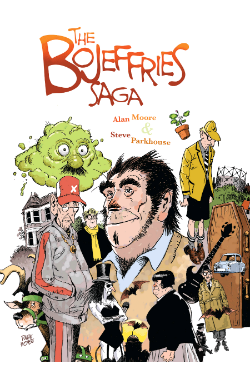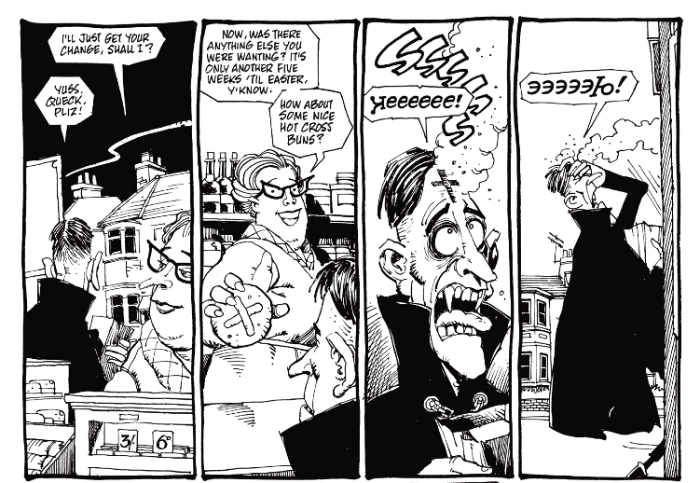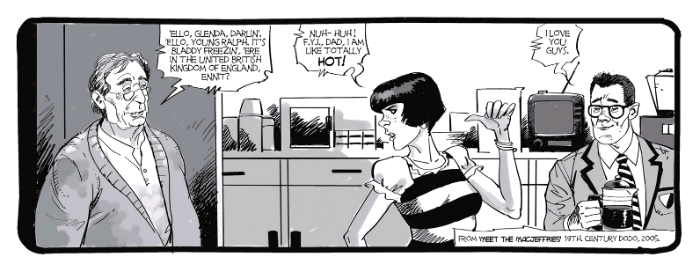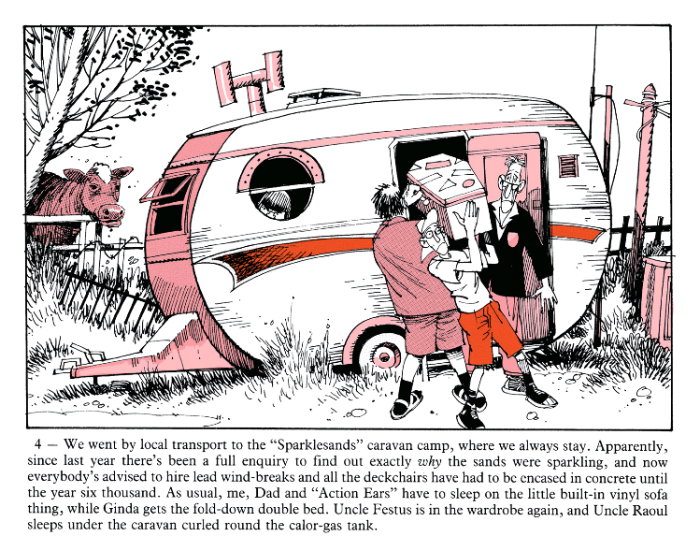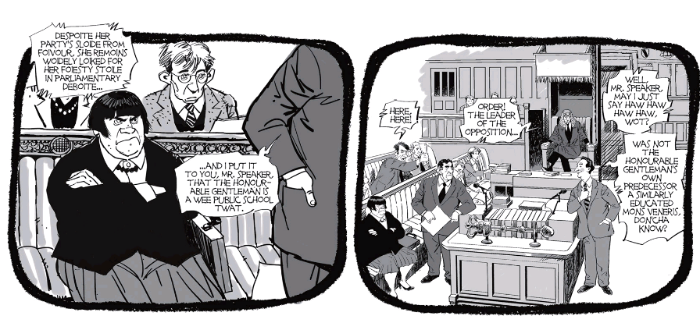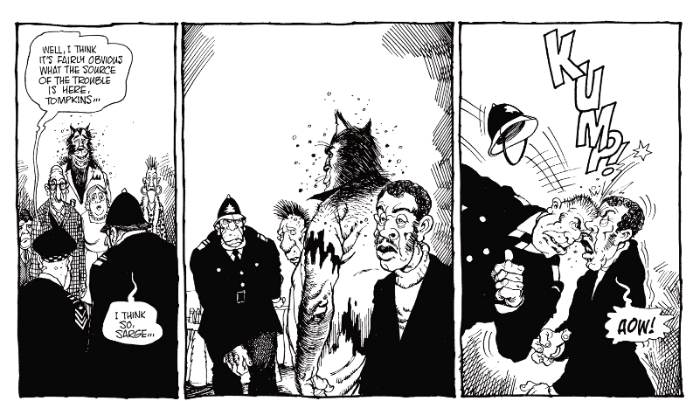“Who Will Buy My Biggish Shoes?" COMICS! Sometimes I Suddenly Realise What A Weird Idea Laugh Tracks Are!
/This time out it’s The Bojeffries Saga by Steve (RESIDENT ALIEN) Parkhouse and Alan (CROSSED PLUS ONE HUNDRED) Moore. What? Yes, I am still in a mood.
 THE BOJEFFRIES SAGA by Steve Parkhouse & Alan Moore
THE BOJEFFRIES SAGA by Steve Parkhouse & Alan Moore
Anyway, this… THE BOJEFFRIES SAGA Art by Steve Parkhouse Written by Alan Moore Top Shelf Productions, £9.99 (paper), £2.50 or something equally paltry (Digital) (2014) The Bojeffries Saga created by Steve Parkhouse and Alan Moore
Collected herein are all the extant Bojeffries Saga stories drawn by the sublime Steve Parkhouse and written by the astonishing Alan Moore. Having them all in one place is extraordinarily handy as the stories themselves were spread around a number of publications (WARRIOR, DALGODA, A-1, etc?) over a period of several decades and I don’t know about you (I’ve heard tales though) but my days of rooting about in longboxes like a pig hunting truffles are long gone. It’s just unseemly for a man of my age, you know. Also, I don’t live anywhere near my LCS. There’s even a previously unpublished strip to round out the book and further tempt the unconvinced. Anyway, a little clearing of the throat and we’re off. AAAahhhurrruHHHffluGGH-ACK-ACK! Oh, god, what is that! Um, it’s a fact: The Bojeffries Saga started in 1983 within issue 12 of Dez Skinn’s UK based monthly B&W anthology magazine WARRIOR. And, let’s be honest here, most of the appeal went over my then thirteen year old head. Far more appealing to my teeny tastes were Moore’s splashy reinvention of super-heroics (with Garry Leach and Alan Davis) in Miracleman and his (and David Lloyd’s) boldly political reinvention in V For Vendetta of The Abominable Dr Phibes as a stylish gutting of the vigilante trope (V isn’t a hero, just sayin’). In comparison with such lurid company The Bojeffries Saga was a somewhat more sedate proposition with, it turned out, equally lasting if far more subtle pleasures. The Bojeffries Saga didn’t change the course of capes comics forever and nor did it encourage people to protest capitalism en masse while sporting masks depicting a crap traitor purchased from a multi-national corporation. However, it did make me laugh. Which I think is the point of a comedy.
THE BOJEFFRIES SAGA by Steve Parkhouse & Alan Moore
Yes, The Bojeffries Saga is a comedy; it is essentially a comic book sit-com about a family. But one written by Alan Moore so the situation in question is, mostly, a humble British terraced house, and the family domiciled therein could only be described as a nuclear family because the baby is a sentient China Syndrome. Grandad Podlasp is a rapidly de-evolving Cthulloid mess, Glinda is a walking super-ego unfettered by self-awareness or restraint, uncle Raoul is a werewolf who isn’t the full shilling, uncle Festus is a vampire singularly failing to adapt to modernity, Reth, the son, consciously refuses to age past eleven and in their ridiculous midst paterfamilias Jobremus Bojeffries is just trying to keep the household running. Now the world don’t move to the beat of just one drum, what might be right for you might not be right for some! SHAZBAT! and I think we’ve all learned a valuable lesson, today, and all that, right? No, America, because not all comedy is like your comedy.
THE BOJEFFRIES SAGA by Steve Parkhouse & Alan Moore
The Bojeffries Saga is nothing like all that business, because The Bojeffries Saga is quintessentially British and very consciously of its time. This does not (Does. Not.) mean it is dated and its humour has faded. It’s still funny and fresh because Parkhouse & Moore’s comic is so beautifully executed I suspect it will prove to have a half-life equal to one of the aforementioned irradiated baby’s motions. Also, by having its nonsensical cast rub up against the actual times in which it was produced like a needy moggy, it produces a kind of satirical static electricity every time the book is opened. You know what I mean. Timeless, innit. On these pages Parkhouse & Moore build up a picture of a Britain that never existed but a picture so informed by authenticity of detail and experience it becomes, satirical excesses aside, a historical document of a Britain which did exist. Remarkable.
THE BOJEFFRIES SAGA by Steve Parkhouse & Alan Moore
And it is, yes, that’s right, it is the little things. (No, see, I’m not making a joke about my penis here, because I have standards (but mostly because you expected one)) If The Devil is in the details then on the evidence of The Bojeffries Saga he’s got quite the sense of humour. (He’s still The Devil though; shun him!) Details, then. Christ, it’s like being back at school this. Okay, details it is. One chapter is written as a libretto by Moore and, logically enough, visually choreographed by Parkhouse as a dance number, and while the lightly comical way this captures and satirises the various gender and class divisions of the average British street of the time is remarkable in its efficiency and precision, being older than your pubes I was most struck by the reminder that car alarms were once as alien as having a werewolf as an Uncle. When the Bojeffries go on holiday the accumulation of only ever-so-slightly embellished detail made it feel like a recovered memory of all the tepid yet in retrospect deeply odd holidays I had endured as a child. Bloodbaths in Little Chefs initiated by PTSD riddled children’s toys (“Action Ears”!) aside, obviously. And industry? Remember when Britain had industries? When the majority of people worked in factories. Making stuff. And things. We used to be the best in the world at that! Making stuff and, er, things. Stanchions and that. Grommets. Instead today half the populace is employed in ringing up the other half of the populace to see if they have had an accident at work (not your fault!) or have purchased PPI recently. And the other half (yes, the third half. Glad to see you’re awake.) of the population have made a lifestyle choice to be poor and are getting fat on my taxes, isn’t that right David Cameron. Ey, David Cameron? Poverty is a “lifestyle choice” alright, you utter ****. (It’s okay, Brian, no need to get Legal involved, nobody reads this shit.)
THE BOJEFFRIES SAGA by Steve Parkhouse & Alan Moore
So, yeah, cough, uh, in one of the summers between terms working hard to piss away my parent’s dreams by failing to get a decent degree I worked for about three seconds in a pet food factory. In a very Bojeffries Saga touch I filled and assembled big cardboard Christmas crackers meant for dogs. They had dog biscuits in ‘em, rather than a very poor joke, a vinyl fish that can tell how sexy you are and a paper crown, obviously; what are you, nuts? The knack was in the folding; skills for life there. Now, limited as my horny handed experience was I can attest that Moore and Parkhouse’s chapter on Raoul’s workplace and their hilariously incendiary night out captures perfectly the bizarrely banal behaviour which passes for normalcy on the factory floor. Yes, in a dismayingly hilarious way Parkhouse and Moore convey all the fun and magic of the now mostly extinct manufacturing environment; with all its tedium, casual racism, cheeky misogyny and ever present threat that unspoken grudges will suddenly flare into violence. Good times, no, but the dog crackers got through. The later chapters might betray a slackening of the satirical noose as the targets seem slightly more obvious, the battles already lost. Mocking Reality TV probably only means something to people who still bear a grudge over the national shock when the light entertainer and Tory (natch) Leslie Crowther exhorted the British public in 1984 (game, set and natch) to “Cuhmm Ahhn DAWHN!”, and they did. It wasn’t Reality TV, but it was the thin end of the wedge. After Leslie Crowther, the deluge. So it’s 2015 and Reality TV has become as accepted as car alarms, but once both were new and both were funny and The Bojeffries Saga is a record of that time. History moves quicker now but The Bojeffries Saga just about kept up.
THE BOJEFFRIES SAGA by Steve Parkhouse & Alan Moore
I mean no disrespect to Steve Parkhouse when I say that Alan Moore’s the draw here because Moore’s the writer and that’s how comics, a primarily visual medium, works. Also, public awareness-wise Steve Parkhouse has missed a trick or two by not dressing like a Victorian dandy or worshipping a sock. Those being actual “lifestyle choices”, David Cameron, as opposed to poverty - which is not. Cowardly one sided baiting of our majority emboldened leader aside, the success of The Bojeffries Saga is down to Steve Parkhouse as much as Alan Moore, but it needs both to succeed, as anyone who has ever read the repellent and woeful Big Dave (which Parkhouse drew for 2000AD) will back me up. That piece of **** has never been reprinted, which is a mercy; for while there was nothing wrong with Parkhouse’s art the, ahem, script by Grant "Rebel, Rebel" Morrison (MBE) and Mark "The Socialist"Millar (MBE) is everything The Bojeffries Saga is not. And I mean that in a really bad way. A really bad way indeed. Posterity got it right by having The Bojeffries Saga survive and so we can still appreciate the lively and joyous art of Steve Parkhouse. Sure, the art on the part of Steve Parkhouse is a delight here, but then when is Steve Parkhouse’s art not a delight. (That’s rhetorical.) Right from the very first episode Parkhouse uses his deft draughtsmanship to conflate the scruffy fun of Leo (Bash Street Kids) Baxendale with the fidgety detail of Robert (Oh, come on now, really? Fritz The Cat, then.) Crumb while also providing facial cartooning the equal of Naoki (Monster) Urasawa. Parkhouse’s art develops, during the volume, from a fastidious approach with a slightly surreal filigree to a looser, and thus, more sprightly approach. Both styles are great but seeing the development flow through his work over the course of these pages is greater still. And Alan, Oor Alan, what of Alan Moore? Alan Moore seems to be having a ball here. Stylistically he shimmies about all over the shop, which is always a sign he’s enjoying his mystical self. There’s a libretto here, a story in the style of a (really) old Brit comic, plenty of fucking about with phonetics, and it’s all pretty ticklish round the funnybone region. Mind you, he still has a tendency to take a running joke and push it so hard that whether or not it passes through The Wall and breaks the tape like Seb Coe (a Tory) depends entirely on the reader. Other than that slight criticism, I’d have to say that The Bojeffries Saga by Steve Parkhouse and Alan Moore was very, very funny, which in real terms equates to VERY GOOD!
Sure, I could have saved us all a lot of grief and just said it was Eastenders by Monty Python directed by Mike Hodges, but where in that lot is there anything about - COMICS!!!


